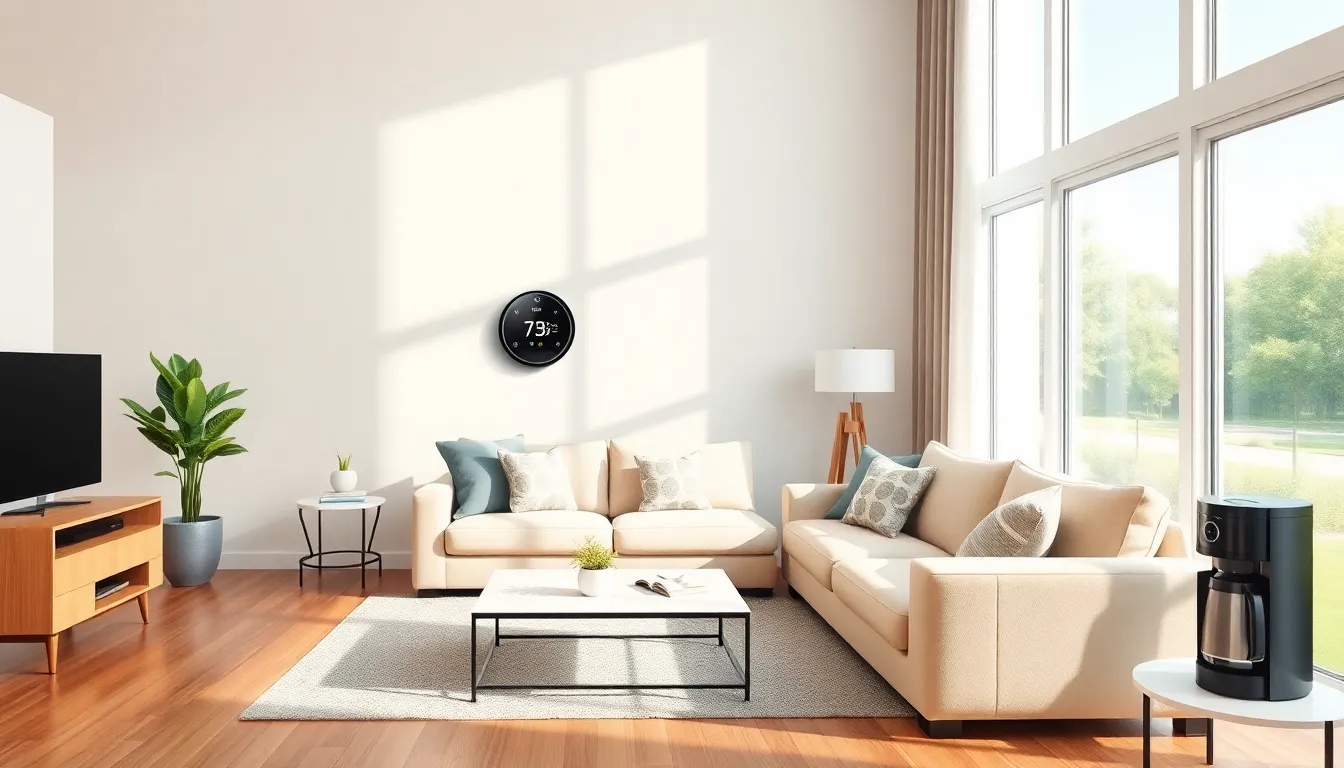In today’s fast-paced world, home tech solutions are like the secret sauce that transforms a house into a smart haven. Imagine controlling your lights, thermostat, and even your coffee maker with just a tap on your phone or a simple voice command. It’s like having a personal assistant who never complains about making coffee at 6 AM!
Table of Contents
ToggleOverview of Home Tech Solutions
Home tech solutions encompass a wide range of devices and systems designed to improve daily life. These solutions enhance convenience, security, and energy efficiency within residences. Smart lighting systems, for example, allow control through mobile apps or voice commands. Homeowners can adjust brightness and color, creating personalized atmospheres with ease.
Smart thermostats help regulate heating and cooling, leading to cost savings. Many models learn user preferences, adjusting automatically to optimize comfort while conserving energy. Another example includes smart security cameras, which provide real-time monitoring and alerts, keeping homes secure from intruders.
Voice-activated assistants serve as central hubs for managing various devices in the home. By using these assistants, users can control appliances, set reminders, and access information through simple voice commands. Homeowners benefit from integrating devices such as smart locks, which offer keyless entry and remote access.
Additionally, home automation systems can coordinate multiple devices to work in tandem. At specified times, users can program lights to turn on or off, appliances to operate, and thermostats to adjust. Integration of these systems often improves the overall user experience by simplifying control.
Entertainment systems also receive upgrades through home tech solutions. Streaming devices and smart TVs connect to the internet, enabling access to a broad range of content. Users enjoy seamless integration with audio systems, enhancing viewing experiences.
An efficient home tech ecosystem provides convenience, comfort, and control, transforming residences into smart homes that cater to individual lifestyles.
Popular Home Tech Solutions

Home tech solutions enhance everyday living and simplify routine tasks. These technologies improve convenience, security, and energy efficiency across various aspects of home management.
Smart Home Devices
Smart home devices connect seamlessly to enhance daily life. Users control smart lighting systems through apps and voice commands, adjusting brightness and color for any occasion. Smart speakers act as central hubs, allowing voice commands to manage multiple devices effortlessly. Appliances like smart coffee makers automatically brew coffee at preferred times. Smart locks provide keyless entry and remote access, ensuring convenience when needing to unlock doors from afar.
Home Security Systems
Home security systems provide peace of mind through advanced monitoring capabilities. Smart security cameras offer real-time video feeds, allowing homeowners to check on their property from anywhere. Motion detectors and door/window sensors send instant notifications for any unusual activity. Many systems integrate with mobile apps, facilitating easy management and monitoring. Some home security solutions include professional monitoring services, ensuring timely responses to alerts and potential threats.
Energy Management Solutions
Energy management solutions optimize household energy consumption effectively. Smart thermostats adapt to individual preferences, learning behavioral patterns to minimize energy waste. Users receive detailed energy consumption reports, enabling informed decisions about usage patterns. Energy-efficient smart plugs allow for scheduling of devices, reducing power consumption when not in use. Automated shading systems adjust window treatments based on sunlight exposure, contributing to overall energy savings.
Benefits of Home Tech Solutions
Home tech solutions offer significant advantages that enhance daily living experiences. These innovations improve convenience, safety, and energy efficiency, effectively transforming households.
Convenience and Efficiency
Smart devices simplify daily tasks. Users manage home environments effortlessly through mobile apps or voice commands. Automated systems adjust lights and thermostats based on preferences, creating personalized atmospheres. Integration among devices fosters seamless operation, allowing tasks like brewing coffee or locking doors with ease. Daily routines become less time-consuming, as homes adapt to individual lifestyles. The ability to control appliances remotely adds another layer of convenience.
Enhanced Safety and Security
Home tech solutions bolster security measures for households. Smart cameras provide real-time video monitoring, allowing owners to oversee properties from anywhere. Instant notifications alert users to unusual activity, enhancing peace of mind. Smart locks enable keyless entry, improving accessibility and security simultaneously. Integrated security systems often link to emergency services for swift responses if needed. Families enjoy reassurance knowing their homes are protected, regardless of their location.
Cost Savings
Energy efficiency leads to substantial savings over time. Smart thermostats optimize heating and cooling, significantly reducing energy bills. Automated lighting adjusts based on occupancy, minimizing waste. Users benefit from the capability to monitor energy consumption through smart plugs and devices. Implementing energy-efficient solutions may provide rebates or lower utility rates. Overall, households enjoy financial relief through lower energy costs while promoting a sustainable lifestyle.
Challenges and Considerations
Adopting home tech solutions presents challenges that require careful consideration. Users should assess compatibility and integration of devices to ensure a seamless experience.
Compatibility and Integration
Integrating multiple smart devices into a single system often proves challenging. User preferences dictate compatibility between various brands and technologies. Some devices may not communicate effectively with others, leading to frustration. Planning for compatibility ahead of time promotes smoother integration. Researching supported ecosystems guarantees that selected devices will work together efficiently. Homeowners benefit from using products that conform to established standards, such as Zigbee or Z-Wave. These standards facilitate inter-device communication and offer more flexible automation options.
Cost of Implementation
Initial costs of home tech solutions can vary widely. Purchasing smart devices often requires a significant upfront investment. Choices around brands, features, and functions influence the overall budget. Installation expenses may add to the total cost, depending on the complexity of the setup. Homeowners might encounter ongoing costs, such as subscription fees for certain services. Evaluating available financing options helps in managing these expenses effectively. Budgeting for both immediate and future costs ensures that smart home technology remains a practical choice.
Future Trends in Home Tech Solutions
Emerging trends in home tech solutions indicate a shift towards greater integration and automation. Voice recognition technology continues its evolution, leading to smarter home assistants that respond accurately and intuitively. Users expect these devices to understand context, making conversations feel more natural.
Artificial intelligence plays a crucial role in enhancing user experience. AI-driven systems adapt to individual habits, preemptively adjusting settings based on past behavior. This intelligence creates a personalized environment, optimizing comfort while minimizing energy use.
Augmented reality has begun to surface in home tech solutions. Through smart glasses, users can visualize how furniture will fit in a space or control smart devices with a simple gesture. This innovation makes home design interactive and accessible.
Sustainability will become a pivotal factor in home tech developments. Smart appliances now monitor energy consumption, providing insights that help users make informed choices. Moreover, innovative technologies like solar-powered devices contribute to a reduction in overall energy costs.
Integration of home tech solutions with health and wellness features is gaining traction. Smart sensors can track air quality and suggest humidity adjustments, thus promoting a healthier living environment. Additionally, fitness trackers now link with home systems, offering users insights into their activity levels.
Consumer demand for security systems is on the rise. Advanced surveillance cameras now employ facial recognition and can send alerts to users’ smartphones in real-time. These innovations contribute to peace of mind and enhanced home protection.
Collaborative platforms will connect disparate devices seamlessly. As more smart home brands emerge, interoperability becomes essential. Future solutions will emphasize compatibility across brands, leading to a more unified smart home experience.
Home tech solutions are revolutionizing the way people live by providing unparalleled convenience and control. These innovations not only enhance daily routines but also promote security and energy efficiency. As technology continues to evolve, users can expect smarter devices that seamlessly integrate into their lives.
The future of home automation looks bright with emerging trends focusing on sustainability and advanced security features. Homeowners are encouraged to explore these solutions to create a personalized smart home experience. By embracing these technologies, individuals can enjoy a more comfortable and efficient living environment tailored to their unique needs.




